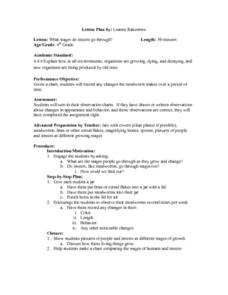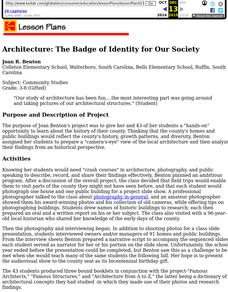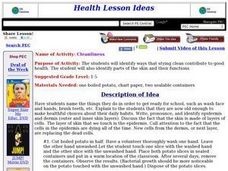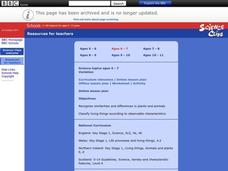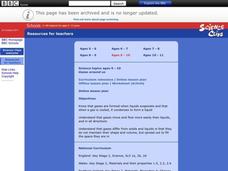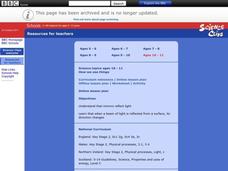Curated OER
What Stages Do Insects Go Through?
Fourth graders observe mealworms over a period of time and record any changes they observe. They record any changes in color, length, behavior, and any other noticeable changes, identify the stages of the mealworms, and create a chart...
Curated OER
Read a Tonsil Poem
Students examine a poster to determine where the tonsils are located and listen as the teacher explains what the tonsils are used for. They read along as the teacher reads a poem about tonsils aloud. They discuss the poem to check for...
Curated OER
Mitosis and Meiosis
Pupils model and differentiate between the processes of mitosis and meiosis. In partners, they use yarn and construction paper to create models for each of the phases of mitosis and meiosis then compare the chromosome numbers in each...
Curated OER
Mellowing With Age, A Closer Look
Students realize that aging is a "natural, continuous process" and develop sensitivity to the needs, desires, and capabilities of the elderly by interviewing elderly community members and photographing age related things.
Curated OER
Architecture: The Badge of Identity for Our Society
Young scholars prepare a "camera's-eye" view of the local architecture and then analyze their findings from an historical perspective.
Curated OER
Brine Shrimp
Students gain a sense of the delicacy and complexity of a living organism and the rather narrow range of conditions under which it can live.
Curated OER
Cleanliness
Students identify ways that staying clean contribute to good health. They perform an experiment involving potatoes and washed and unwashed hands, observing the results. They complete a cleanliness chart, checking off each healthful habit...
Curated OER
Ourselves
Students use a website to name and compare external body parts of humans and other animals.
Curated OER
Sound and Hearing - Internet Research
Students use a website to help them recognize that sound is generated in a variety of ways and from different sources. They determine that sounds vary in tone and loudness, and learn there are different ways to describe sound.
Curated OER
Moving and Growing
Students know that humans and some other animals have bony skeletons inside their body. They know that other animals have skeletons on the outside of their bodies. They explain the role of both kinds of skeletons.
Curated OER
Circuits and Conductors
Young scholars participate in an online lesson to explain the conductivity of different materials and the effect of changing the power source.
Curated OER
Variation
Students participate in an online lesson to reinforce the similarities and differences in plants and animals. They classify living things according to observable characteristics.
Curated OER
Gases Around Us
Learners participate in an online lesson showing that gases are formed when liquids evaporate and that when a gas is cooled, it condenses to form a liquid, and gases move and flow more easily than liquids, and how gases differ from solids.
Curated OER
Changing State
Students participate in an online lesson plan to investigate the effects of cooling and heating on water.
Curated OER
Micro-organisms
Young scholars examine how micro-organisms are living organisms that are often too small to be seen. They explain that micro-organisms may be beneficial or harmful.
Curated OER
How We See Things
Students explain that mirrors reflect light. They examine how when a beam of light is reflected from a surface, its direction changes.
Curated OER
Changing Circuits
Students participate in an online lesson to explain how to make bulbs brighter or dimmer in a series circuit by changing the number or type of components.
Curated OER
Introduction to Graphical Representation of Data Sets in Connection with Nuclear Decay
Students record data, make observations, and share in experimentation and discussion of numerical experiments.
Curated OER
Stem Cuttings
Students select the best non-flowering stems of plants and remove the leaves from the soon to be buried portion of the stem. They fill seedling flats with soil and insert the cuttings, label, and water.
Curated OER
What's That Brown Fuzzy Stuff On My Plum?
Young scholars examine Koch's Postulates by actually using them. They perform each of the required four steps to show that the brown fuzzy fungus they see growing on stone fruit (plums, peaches, nectarines, cherries) is what causes them...
Curated OER
Particulate Matter: The Lorax
Students collect air samples to test it for air pollution. They are read the story The Lorax and discuss the effects of air pollution. They share their observations with the class.
Curated OER
Desert Xeriscaping
Learners recognize native species of desert vegetation while examining the need for water conservation. They design and create a xeriscape landscape using a variety of materials.
Curated OER
Harve and Ester's Tree Company
Students examine the role of trees in their lives. They identify products that come from trees and their uses. They are read a book about trees as well.
Curated OER
Out of the City and Into the Soup
Pupils examine the issue of air pollution. They read and analyze an article, evaluate the responses of state and federal officials to the problem, conduct Internet research, and write a letter to their senator and congressman.
Other popular searches
- Plant Growth
- Personal Growth Plan
- Plant Growth Nutrients
- Graph Plant Growth
- Plant Growth and Development
- Plant Growth Stages
- Plant Growth Unit
- Plant Growth and Change
- Indoor Plant Growth
- Plant Growth Journal
- Plant Growth Cells
- Denuded Plant Growth


